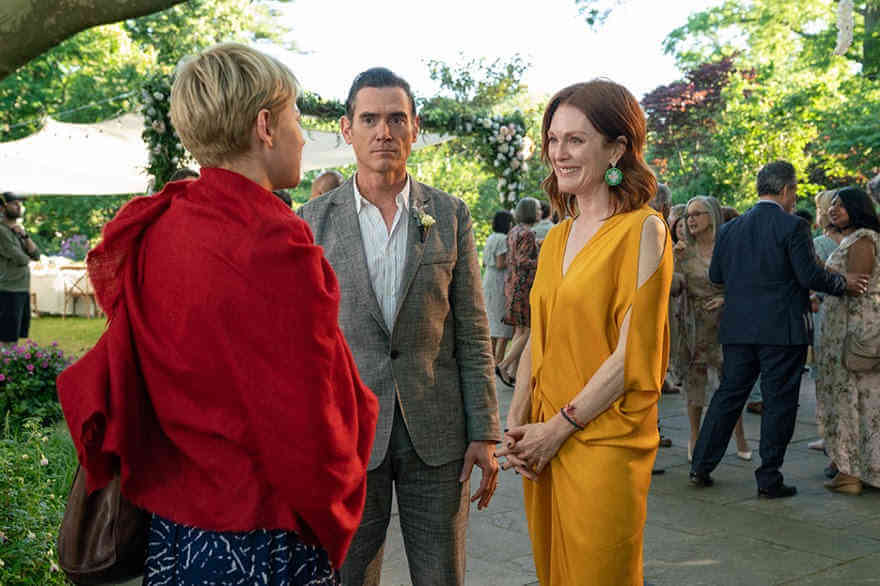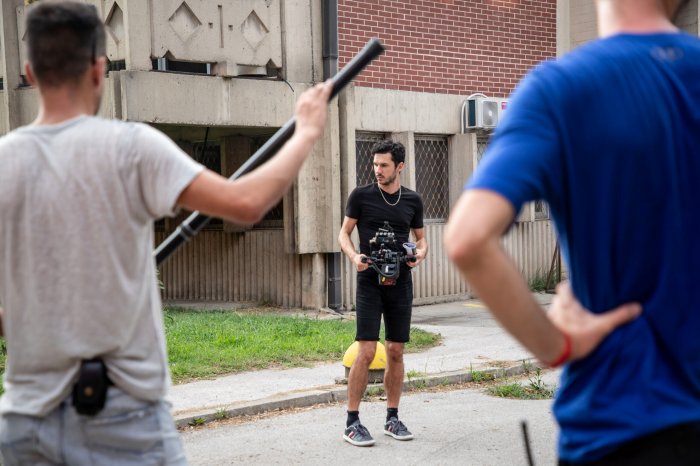I didn’t want to write about “After the Wedding,” the reboot of Susanne Bier’s 2006 Danish film, newly brought to life with an American director and cast, its gender roles flipped, and its settings and plot altered, though not betrayed.
Not because I disliked or was disappointed or angered by the remake. I was surprised by it, caught unaware. It used to be a given that an American version of a foreign film would be flat-footed and devoid of the charms of the original: Americans inevitably revealing our tendency toward the too explicit, the simplistic, the overly sentimental. But this new version wove a spell from start to finish, one I didn’t want to dissect or analyze.
I remembered very little about the original film, other than that I’d found it thoughtful and engrossing. Its charismatic star, Mads Mikkelsen, was an actor who always managed to convey intelligence and psychological complexity; I invariably wanted to see a film if he was in it.
The rebooted version cast Michelle Williams in his role, an intriguing idea, not only because of the sex change. Williams has had an unusual career of showy roles that polarize (2011’s “My Week With Marilyn”) and less showy, undervalued performances that reveal substantial gifts (a brilliant comic turn in 1999’s “Dick”; a heartbreaking tour de force in 2008’s “Wendy and Lucy”). Since her astonishing performance channeling Gwen Verdon in TV’s “Fosse/Verdon,” I assumed she’d no longer need to keep auditioning for A-list iconic status; her indelible talent was no longer possible to ignore.
But I didn’t want to write about her. I didn’t want to investigate how her approach to the art of acting, so pared down, meshed with that of a very different if also invaluable actor, Julianne Moore, and how together they worked a sort of alchemy on screen, enriching the script and elevating the performances of everyone around them. Even their male costar Billy Crudup, an actor whose work has been inconsistent since he first captivated in small indie character roles, rose to the occasion. (Being secondary to a strong female cast, as he was in 2015’s “20th Century Women,” seems to bring out the best in him.)
But I didn’t want to parse why, long after seeing “After the Wedding,” I still remember — feel — the distinct pleasure of sitting in the theater enthralled by its twisty story and cinematic beauty and the performances that imbued it with such emotion. I wanted to stay with the sensation: the giddiness I feel when some rare magic brings all the elements in a work of collective art together to create something alive and emotionally compelling and beautiful, thrilling in a way that renders insignificant whatever failings it may have.
Then I clicked on a review in The New Yorker to see if its critic had something to convey that might expand my understanding of the film.
He did not.
He wrote about being overtaken by “giggles” early in the movie, and his valiant if unsuccessful effort not to surrender to them completely as it unspooled. I wondered, reading his words, if The New Yorker, or any other mainstream publication, would have granted the oracular weight of publication to an equally dismissive—contemptuous—take from a female critic on a male-themed film. The entitlement in his review, the derisive approach to the story, it seemed to me, would not have been permitted had it been a piece about, say, Quentin Tarantino’s latest movie, a love letter to a world in which men are cheered for setting surly oversexed teen-girl witches on fire, and the ostensible female subject of its bloated, purposeless tale is reduced to a smiley-faced empty vessel, essentially assassinated again under the guise of being rescued. Would a female critic have been granted a platform to express her contempt for, say, the endless comic book pictures the machine of Hollywood continues to manufacture, a female voice given the endorsement of the esteemed New Yorker to vent a similarly lazy and indulgent take-down? The magazine validated a gut reaction with little underpinning it beyond a critic’s certitude that his gut was of more value than the work of artists he was tasked with analyzing. Any female reviewer behaving similarly would have been considered an embarrassment—and no doubt an incitement to online rape/death threats.
I vaguely remembered a piece years ago that uncovered this particular critic’s fetishizing of actresses in his reviews, the way his swoony declarations about their hair or other features seemed to inform his entire approach to the art he was reviewing. It reminded me of a theater critic who wielded power for years despite his regular vicious attacks on perceived physical flaws of female actors, a man who stated without fear of contradiction or reprisal that recasting a male lead as a female reduced a drama’s impact, since a woman’s life did not hold the value and power a man’s did. (He extended this worldview to nonwhite and nonheterosexual people as well, but with less ad hominem specificity and glee.)
Reviews are not objective fact, of course, but subjective opinion. And I know well the feeling of being underwhelmed by a movie or play or book. Certainly the New Yorker critic, who has held his job for decades despite the countless writers whose perceptions and abilities would enrich our cultural conversation vastly more, is entitled to his feelings. Just because I responded strongly to an old-fashioned melodrama made new by contemporary female protagonists does not mean he has to. It’s his right to join the masses enthralled by the adolescent male conventions that comprise the majority of films promoted worldwide: boy-driven bromance buddy comedies and action movies and heist/gangster/cop period pieces and superhero tentpoles in which token females are cast as receptacles: for lust, to confirm the heterosexuality of their male leads—though even this is bothered with less and less; for male rage (disposable proof of their virility).
I only wish this reviewer’s inability to take its female-centered story seriously was something he thought to question, letting oxygen be spent not on privileging his lack of imagination and empathy but leaving to others the work of analyzing the meaning of the work created by its many participants.
The dismissal of female-centered work continues apace, largely overlooked in the #MeToo #Time’s Up debate, yet dispiritingly prevalent in our mainstream criticism and the blogosphere. That critics’ opinions influence the marketplace and thus the ability of certain works to get funded and promoted and given a platform and a valued place in our society would seem obvious. We may continue to act as if female-themed or -motored works exist on an even level playing field, but they do not. When light female entertainments are trashed for failing to live up to standards not applied to boy stories; when male-centered work with little artistic merit is celebrated and glorified because reviewers occupy and respond to the gender in the driver’s seat; when female directors, writers and stars’ stories are considered insignificant or lacking mainstream interest or importance, it has a distinct effect. There is a cost. Like sexual harassment and assault, the weight of an unbalanced system of judgment and reward is known to any woman who’s ever worked in the film industry, lodged in our very cells, in danger of being as internalized and submerged.
It’s time to bring it out in the open. The men who fund those entertainments that mirror their particular experiences only may not be interested in change, but the publishers who continue to allow female-themed work to be judged by a different standard can take more steps to represent their actual readers, and help lead their audience into a more interesting cultural world.
Meanwhile, if the playing field were level, Michelle Williams and Julianne Moore’s performances in “After the Wedding” would be filling the airwaves with buzzy Oscar talk. Instead we get Brad Pitt, talk of the town for playing a man who looks good with his shirt off (even in his 50s!), and whose character development consists of beating people up and having probably killed his wife for being whiny and annoying. He’s a champion for getting away with it all — he’s our hero.



































